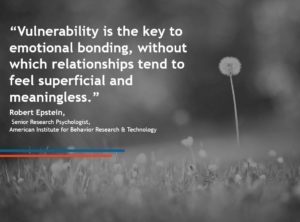Building Relationships through Sharing Vulnerability
Managers work so hard to build effective teams and develop strong working relationships. Communication and Listening Exercises is the #1 post on this blog for good reason. Learning to communicate and listen, however, is only half the battle. Bringing people together also requires sharing vulnerability.
 When I first watched Brené Brown’s TED talk on the Power of Vulnerability. I was familiar with Robert Epstein’s quote, “Vulnerability is the key to emotional bonding, without which relationships tend to feel superficial and meaningless.” But, Brown digs deeper into the nuance of vulnerability, linking it to feelings of shame and unworthiness.
When I first watched Brené Brown’s TED talk on the Power of Vulnerability. I was familiar with Robert Epstein’s quote, “Vulnerability is the key to emotional bonding, without which relationships tend to feel superficial and meaningless.” But, Brown digs deeper into the nuance of vulnerability, linking it to feelings of shame and unworthiness.
Seeing vulnerability as weakness or courage
In her talk, Brown asks her audience to think of a time they felt vulnerable. I immediately thought of the time I was asked to share “a marketing effort that flopped” at a conference I’d attended for many years. I weighed the risks (looking and feeling stupid within my professional community) against the benefits (helping others learn from my failed effort), and ultimately decided to do it. To follow up, Brown asks if that vulnerability felt like weakness. While I might not have used that word, I do recall feeling tentative and exposed, wondering what the audience would think of me.
Brown then asks her audience to think of others who faced a similar challenge. If the tables were turned, would we think of folks in a similar situation as weak, or perhaps just the opposite, courageous? Most people perceive others who openly share a vulnerability as quite brave, as did I. Looking back on the experience, I recall more than a handful of people approaching me after the presentation, offering a hug (which I didn’t need) and accolades for my courage to share (always appreciated), letting me know how meaningful it was to them, or sharing their own flops.
Vulnerability and relationship building
Another “vulnerability memory” that sticks with me dates to my college days. I’d been so focused on projecting a strong outer image that two of my closest friends, Lisa and MaryJane, didn’t realize how much I valued their friendship and started to pull away. I finally broke down in tears one day, sharing my sadness and loneliness. Revealing my vulnerability, I quickly appreciated that relying on friends is a two-way street. They too wanted to feel needed. I was reminded of this again a few years ago, when I was recovering from a mastectomy. Accepting care is as much a gift to the giver as to the receiver.
Acknowledging need and asking for help can be especially challenging at work. If you’re not the business owner or boss, you might worry that showing vulnerability could be detrimental to your job. When coming up with discussion prompts for one of our workplace Thumballs, we had a lengthy conversation about some of the prompts that concerned a few of the folks on our team. They worried that employees might feel uncomfortable answering:
- The thing you most procrastinate
- Something you wish you were better at
- A task you’d love help with
As a manager, I was thinking how valuable that information would be. It would allow me to adjust roles or provide necessary training. But I understand the tension and my colleagues’ sensitivity to employees not wanting to reveal themselves in that way. Perhaps in some workplaces, admitting vulnerability is unwise. This is unfortunate because these organizations likely forfeit the growth and relationships that such honest conversations yield. Ultimately, we changed those prompts to be more positive, so that team members could slowly open the door to honest sharing, without feeling compromised:
- What you wish someone else would do for you
- Something you like to do on your own time
- What you wish you could change about your role
You go first!
Even when we know that vulnerability is important to building relationships, nobody wants to take the first step. The Getting to Yes negotiation framework suggests the best way to get someone else to open up is to go first. Negotiation experts suggest that we model the behavior we seek from others and they’ll follow our lead. Moreover, we should go a step further and be completely transparent about it. I’ve done this plenty of times with people I know well, and others I don’t. Kids these days seem to find it easy to preface an uncomfortable situation with a simple disclaimer saying, “This is awkward!” I’d go a step further and explain my unease, as well as the ways sharing vulnerability fosters trusting relationships.
Tools for Sharing Vulnerability
If you’re not one of those people who can just start blurting stuff out, try one of the dozens of conversation starter tools, readily available online at Trainers Warehouse. Thumballs are fun because they make a game of starting conversations. Each ball has 32 conversation prompts. Whoever catches the ball responds to the prompt under their thumb. With the UNZIP-it! pockets, just pick a card. The beauty of the balls and card decks is the ability to choose prompts that are perfectly suited to the level of existing relationships. Plus, as you can tell from the exchange described above, all prompts are carefully curated and vetted, so they’re thoughtful, appropriate, and relevant.
Building Relationships
In Fiddler on the Roof, Tevye, a father of 5 daughters, struggles with his girls’ wanting to marry for love, despite his family’s tradition of arranged marriages. Reflecting on his own 25 years of marriage, he shyly asks his wife, “Do you love me?” Initially, she replies, unemotionally:
For twenty-five years, I’ve washed your clothes,
Cooked your meals, cleaned your house,
Given you children, milked the cow.
After twenty-five years, why talk about love right now?
Golde: I was shy.
Tevye: I was nervous.
Golde: So was I.
So, now I’m asking, Golde… Do you love me?
For twenty-five years, I’ve lived with him,
Fought with him, starved with him.
For twenty-five years, my bed is his.
If that’s not love, what is?
Golde: I suppose I do.
Tevye: And I suppose I love you, too.
The scene ends in this moment of intimacy, leaving the audience with an understanding and confidence in their relationship. They are the perfect embodiment of Alain de Botton’s assertion,
“Compatibility is an achievement of love; it shouldn’t be its precondition.” ~Alain de Botton
Deeper relationships, at work and at home, are “achievements” because they take work. They require active effort to communicate, listen, courageously expose vulnerabilities, and build trust. The process may be slow and require many iterations, but the benefits of sharing vulnerability most certainly outweigh the effort.
Read more…
Making new friends: Building relationships through Communication
Asking Questions: What we didn’t learn in kindergarten

